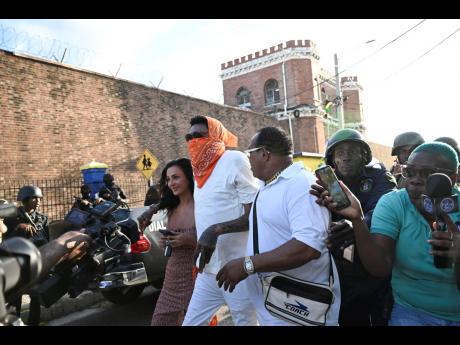Editorial | Beyond corrupt juries
Now that the Court of Appeal has ruled against a retrial of Vybz Kartel and his cronies for the alleged murder of Clive ‘Lizard’ Williams, Parliament must urgently amend the law to allow trials to continue with judges only when bad-faith jurors are unmasked.
This need not be a drawn-out or complicated exercise. Neither should it await the proposed formal examination of whether Jamaica should abolish jury trials altogether. Waiting opens the possibility of another Kartel case-type incident.
Indeed, as this newspaper suggested in March when the Privy Council remitted the Kartel matter to the Court of Appeal, Jamaica can lift, almost verbatim, Section 46 of the Criminal Justice Act of 2003, that deals with how to handle tainted juries.
Vybz Kartel, whose real name is Adidja Palmer, is a popular Jamaican dancehall entertainer. He somehow managed to release a slew of songs and give interviews to foreign broadcast media during 13 years in jail, from which he was released last week.
In 2014 Kartel was sentenced to life in prison, with the possibility of parole after 35 years, for allegedly orchestrating Williams’ murder. Williams, reportedly, couldn’t account for two illegal guns he was given for safe keeping.
Three of Kartel’s associates – Shawn ‘Shawn Storm’ Campbell, Kahira Jones and Andre St John – were similarly sentenced to life. They, however, would have been eligible for parole 10 years earlier. Another accused, Shane Williams, was acquitted at the trial.
Williams’ body wasn’t found. Prosecution evidence at the trial, including telephone voice notes, supposedly had Kartel boasting that it could never be, because it had been chopped too fine to be discovered.
The Privy Council, a UK-based body that acts as Jamaica’s final court, ultimately held the quartet’s conviction to be unsafe.
MISCREANT
The jury that decided the case had a member, “the miscreant” as the Privy Council called him, who had offered bribes to fellow jurors to return an acquittal. That juror, Livingston Caine, was last year convicted of attempting to pervert the course of justice and sentenced to 12 months in jail at hard labour. His lawyers had planned to appeal the verdict.
Caine’s bribery scheme was disclosed by the jury’s forewoman on the final day of a complex 64-day trial. That was weeks after another juror had asked to be excused from the panel because one of the accused had seen her talking to her son at the same lock-up where he was being held.
Had Caine been removed from the jury, as defence lawyers proposed at a chamber conference, the jury would have fallen to below the number required at the time for murder cases.
The prosecution said they were willing to take their chances with the mala fide member, rather than discontinue the case. The presiding judge, Lennox Campbell, agreed that the case could be continued.
Justice Campbell’s decision to maintain the offending juror, and for the case to continue, was one of the grounds on which the quartet appealed, arguing that it infringed their right to a fair trial.
Such a jury, they argued, might be driven, unconsciously or otherwise, to overcompensate for the actions of a misbehaving member.
The Privy Council agreed.
SERIOUS CONSEQUENCES
Said the Privy Council judges: “In coming to this conclusion, the Board is mindful of the very serious consequences which may flow from having to discharge a jury shortly before the end of a long and complex criminal trial. It is also very conscious of the danger of deliberate attempts to derail criminal trials, in particular in their closing stages, by engineering situations in which it becomes necessary to discharge the jury.
“In England and Wales legislation now provides that in certain circumstances, it is permitted to discharge a jury because of jury tampering and to continue the trial without a jury but by judge alone… However, in the absence of such a provision – and there is no such provision in Jamaica – there will be occasions on which, as in the present case, a court will have no alternative but to discharge a jury and end the trial in order to protect the integrity of the system of trial by jury.”
The Privy Council sent the case back to the Court of Appeal to decide whether Kartel and the others should be retried.
Unsurprisingly, the Jamaican judges – taking into account, among other things, the time the men have been in jail, how long it would take to mount a new trial and likely complexity of such an undertaking – said ‘no’.
This having happened, the Government must expand on the narrow choice that faced Justice Campbell by adopting the provisions of the British law.
Section 46 (3) of the UK Act says: “Where the judge, after considering any such representations (on his intentions), discharges the jury, he may make an order that the trial is to continue without a jury if, but only if, he is satisfied —
(a) that jury tampering has taken place, and
(b) that to continue the trial without a jury would be fair to the defendant or defendants.”
We recommend this provision to Jamaica’s administration.

